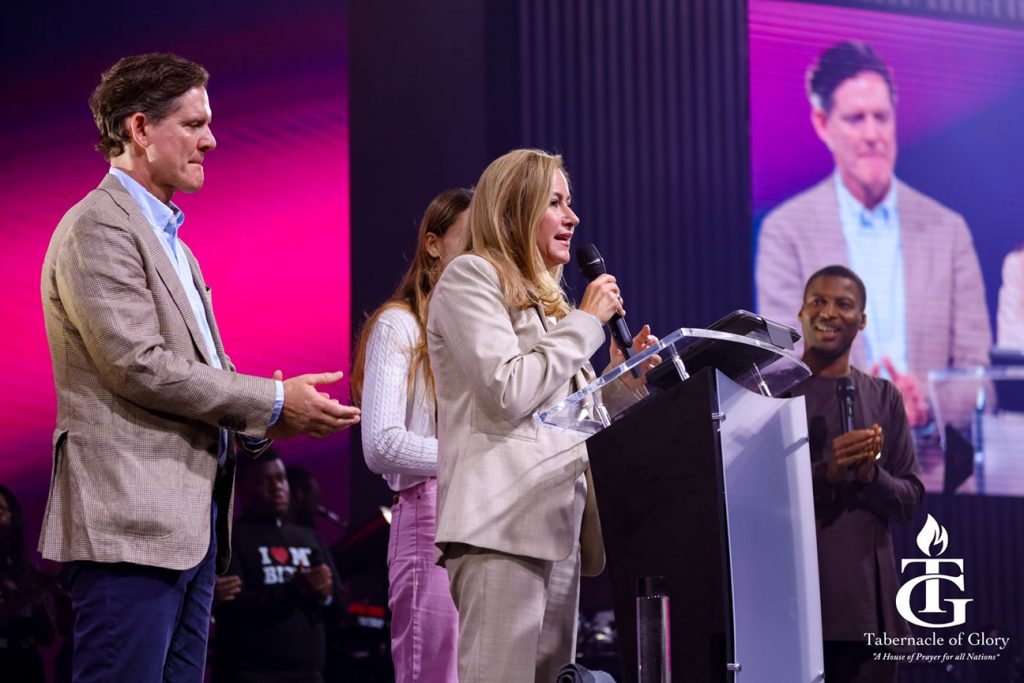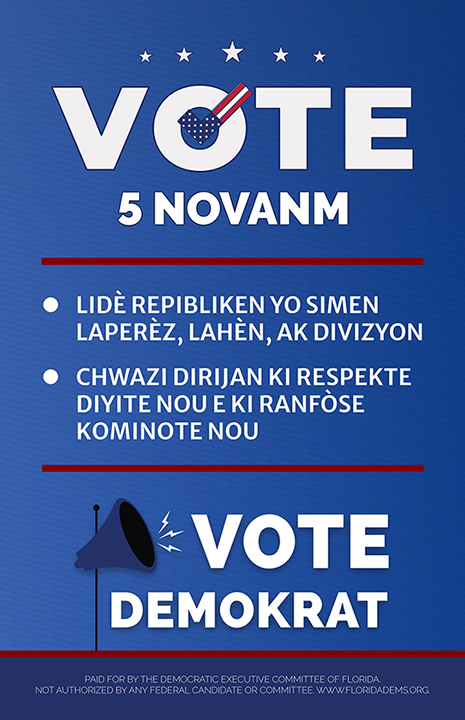By Dessalines Ferdinand, Le Floridien
MIAMI DADE — On Sunday, October 28, South Florida’s Haitian community witnessed a historic political moment as Bishop Gregory Toussaint, senior pastor of Tabernacle of Glory’s Miami campus, hosted two high-profile candidates vying for the U.S. Senate. In a groundbreaking dual appearance, incumbent Republican Senator Rick Scott and his Democratic challenger, former Representative Debbie Mucarsel-Powell, engaged with the congregation just days before the November 5 election.
The former Florida governor’s early-morning appearance stemmed from the efforts of Sandra Saint-Hilaire, the young and dynamic Executive Director of the Miami-Dade County State Legislative Delegation. Saint-Hilaire successfully highlighted the importance of the Haitian vote, noting that while many Haitian-Americans support Democratic ideals, a substantial number share Republican values. Her persuasion secured Scott’s participation, underscoring the senator’s interest in connecting with Haitian-American voters.

Shortly after Scott’s visit, Mucarsel-Powell arrived at the same venue, with talk circulating within the Haitian community that Jeff Lozama, Past Chairman of the Haitian-American Chamber of Commerce of Florida, had coordinated the swift arrangement. This last-minute addition stirred some dissatisfaction within Scott’s camp, as some felt that the Republican candidate’s outreach was overshadowed by the back-to-back scheduling with his opponent.
Is Bishop Toussaint Playing Both Sides Politically?
Critics have suggested that Bishop Toussaint appears to be playing both sides politically; however, hosting opposing candidates is generally seen as an acceptable practice for a pastor committed to maintaining neutrality. Toussaint’s decision to provide each candidate with an individual time slot enabled the congregation to hear distinct perspectives without favoritism. His online post expressed gratitude for both visits and encouraged his congregation to vote, emphasizing civic responsibility as a means to bring meaningful change to their families and community.
“We are grateful for the recent visit from U.S. Senator Rick Scott and former U.S. Representative Debbie Mucarsel-Powell, both of whom are running for the U.S. Senate. It was an honor to welcome you to our church and have you speak to our Haitian community,” wrote Bishop Toussaint in a post on his official English-language Facebook page, accompanied by photos of both candidates’ teams.
Toussaint added, “As we approach voting day, let’s remember that voting is a powerful way to make our voices heard and bring positive change to our families and community. Go out this week and cast your votes.”

Bishop Toussaint’s actions could be interpreted as politically balanced rather than playing both sides. This dual-candidate event illustrated Bishop Toussaint’s commitment to offering his congregation an unbiased political platform, empowering them to make informed decisions. Although some supporters of Scott may view Toussaint’s approach as a hedge against partisan affiliation, Toussaint’s decision to extend the invitation to Mucarsel-Powell as well signified a balanced approach that allowed the community to hear from both parties.
Beyond its immediate impact, the event demonstrated Toussaint’s role as a bridge-builder within the community, creating a space where politics and faith intersect to address pressing social issues. By hosting both Senate candidates, he emphasized the importance of Haitian-American voices in the electoral process, affirming the value of civic engagement in strengthening their community’s influence.
For Florida’s Haitian community, this occasion marked a turning point. Political leaders are recognizing the growing significance of Haitian-American voters, and Bishop Toussaint’s role in facilitating this dialogue underscores the capacity of faith-based organizations to foster civic responsibility and enhance the community’s political clout. His decision to welcome candidates from both sides conveyed a message of inclusivity, empowering the Haitian community to assert their place in the political sphere.
Ultimately, this event at Tabernacle of Glory last Sunday demonstrated the congregation’s ability to influence discourse and reminded the Haitian community of the power of unity and advocacy. It underlined that the church serves not only as a spiritual sanctuary but as a central stone for civic engagement, where faith aligns with action to elevate community aspirations. This moment will likely resonate beyond this election, fortifying the Haitian community’s role in shaping policies that impact their lives.

